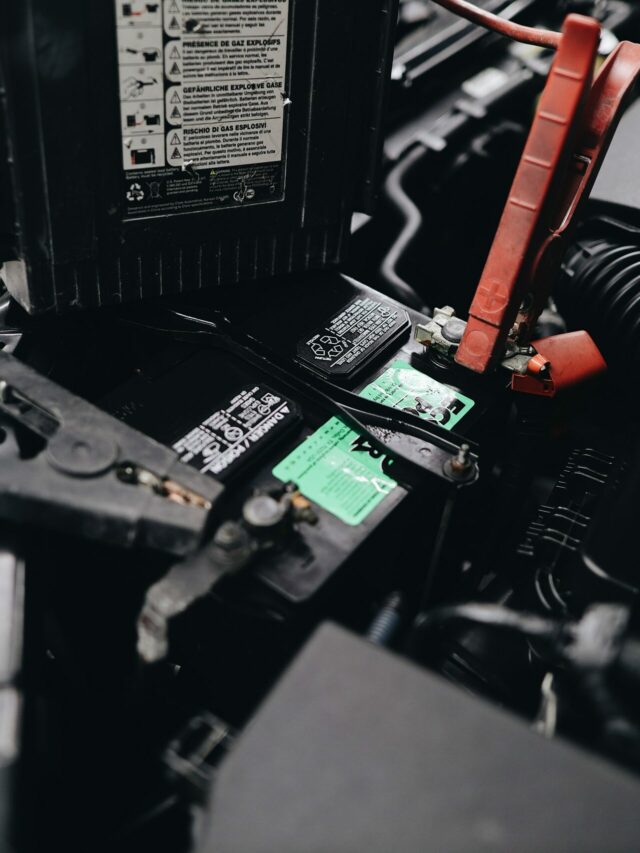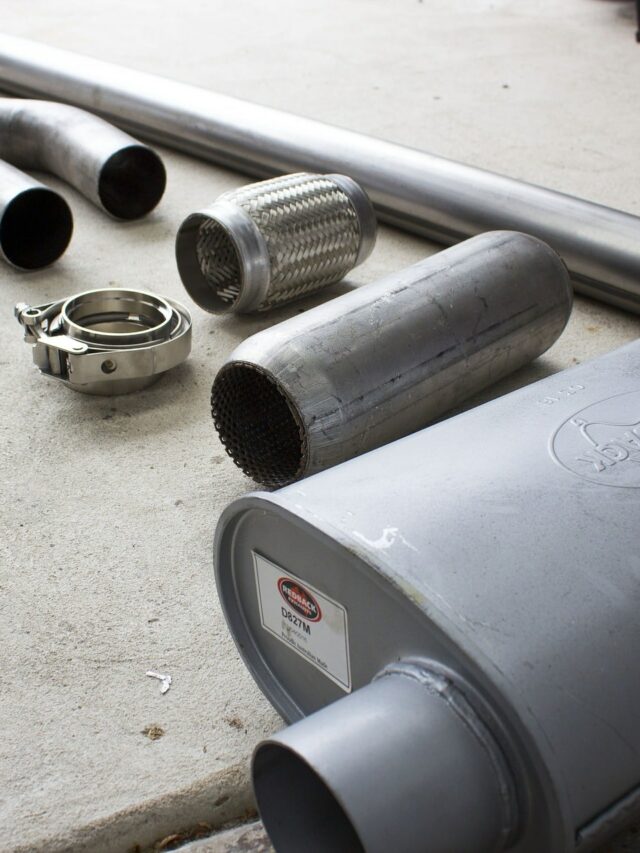Why does my car smell like rotten eggs?


Why does my car smell like rotten eggs? To understand why your car smells like rotten eggs, you need to know how your car’s exhaust system works. The chemical reactions inside the exhaust system can often lead to unpleasant smells.
In this section, we’ll explain How a Car’s Exhaust System Works, the Chemical Reactions in the Exhaust System, and Possible Causes of the Rotten Egg Smell that can help you diagnose the source of the odor.
How a Car’s Exhaust System Works
A vehicle’s exhaust system is responsible for providing a safe and efficient outlet for the gases generated by the engine. The system comprises pipes, muffler, catalytic converter, oxygen sensor and other components that work together to discharge harmful gases out of the car.
The internal combustion engine creates various exhaust gases including carbon monoxide, nitrogen oxides and sulfur dioxide which mix with water vapour to create an unpleasant smell that affects passengers in the car. When the ignition timing or fuel mixture is off-balance or due to a malfunctioning catalytic converter or oxygen sensor, this scent may become more noticeable.
To prevent or reduce this type of smell inside vehicles, one can check the emissions control system regularly as suggested by manufacturers or mechanics. Ensuring proper functioning of all parts can also help improve air quality within the vehicle.
It’s essential to note how critical it is for car owners to maintain their cars properly consistently and schedule regular maintenance checks. Preventative measures will save them money in future repair costs while keeping their transport ready for operation and free from odours affecting its ride experience.
If you thought your car was just producing exhaust fumes, think again – it’s really running a chemistry lab under your hood.
Chemical Reactions in the Exhaust System
Chemical processes in the exhaust pathway can lead to a foul smell in vehicles that is often compared to the odor of rotten eggs. These reactions occur due to the presence of certain chemicals in the fuel or lubricants, as well as incomplete combustion of these materials.
To better understand this phenomenon, we have created a table showcasing various components that contribute to chemical reactions in the car’s exhaust system. The table includes columns such as Chemicals Present, Causes, and Effects on Odor. It also includes data on sulfur dioxide levels and nitrogen oxide emissions, which are significant contributors to unpleasant exhaust odors.
| Chemicals Present | Causes | Effect on Odor |
|---|---|---|
| Sulfur Dioxide | Presence in fuel or lubricants and incomplete combustion of materials. | Rotten egg odor |
| Nitrogen Oxide | High combustion temperature and oxygen availability, often due to excess air in fuel mixtures. | Metallic or sharp odor |
It’s important to note that while these chemical reactions can be frustrating for drivers, they also pose health hazards. Exposure to sulfurous compounds released by these reactions may cause respiratory problems or aggravate existing conditions such as asthma.
As drivers, it’s crucial that we take steps to minimize our impact on the environment by ensuring that our cars are functioning efficiently and not causing unnecessary pollution. Regular vehicle maintenance and replacements are key steps toward reducing emissions and keeping our air clean. Don’t let fear of missing out on a comfortable ride stop you from taking action today!
If your car smells like someone left a carton of eggs in the trunk during a heatwave, these possible causes might help you crack the mystery.
Possible Causes of Rotten Egg Smell
After your car starts smelling like rotten eggs, one of the potential causes could be a faulty catalytic converter. While functioning efficiently, a catalytic converter turns sulfur dioxide in your exhaust gas into odorless sulfur trioxide. If something goes wrong with the oxidation process, that could potentially cause the smell.
Additionally, the rotten egg smell may also arise from an overcharged battery. The overcharging leads to the leaking of sulfuric acid, which gives off the odor. Along with regular checks on your battery life, maintenance and replacement can help you avoid this issue.
It’s important to note that although there are various reasons for the smell, they all need urgent attention. Ignoring them could lead to severe consequences such as breathing issues and even explosions.
Interesting fact: It is believed that our sense of smell has evolved as an essential tool for survival when it comes to substances like rotten eggs or poison gases. Our nose can identify hydrogen sulfide (smelling like rotten eggs) at 0.5 parts per billion!
Why does my car smell like a science experiment gone wrong? The answer may stink, but it’s better to know the common culprits of rotten egg smell in your car.
Common Reasons for Rotten Egg Smell in a Car
To understand why your car smells like rotten eggs, let’s take a look at the common reasons for this occurrence. In order to solve this issue, we’ll discuss sulfur buildup in the catalytic converter, failed oxygen sensors, fuel system issues, engine problems, and the possibility of a dead rodent in the car as sub-sections.
Sulfur Buildup in the Catalytic Converter
A common issue that car owners might face is an unpleasant odor resembling rotten eggs. This could be due to sulfur buildup in the exhaust system, particularly the catalytic converter. The catalytic converter plays a crucial role in reducing harmful emissions by converting them into less harmful compounds. However, when sulfur compounds present in gasoline and engine oil combine with heat, they can form sulfur oxides and result in that unwelcoming odor.
To tackle this issue, car owners may try increasing their driving speed to allow the vehicle’s exhaust system to heat up adequately, which can burn off excess sulfur deposits. Alternatively, getting the catalytic converter checked and cleaned by a professional mechanic can solve the problem.
It is crucial to note that neglecting this issue can lead to further complications such as poor engine performance and damage to the catalytic converter, resulting in costly repairs.
Car owners should regularly check for any strange smells, sounds or changes in engine performance, since prompt action can prevent extensive damages beforehand.
Don’t hold your breath, a failed oxygen sensor could be the culprit behind that foul egg smell in your car.
Failed Oxygen Sensor
When the vital component responsible for measuring the oxygen levels in your car’s exhaust system fails to function correctly, it can cause a disturbance in the vehicle’s performance, leading to severe issues.
A failed oxygen sensor can trigger various problems, such as diminished fuel economy, black smoke from the exhaust, and an increase in emissions. To give you an idea of how important this component is for your vehicle’s smooth running, here are some critical aspects of a Failed Oxygen Sensor:
| Issues Caused | Solutions |
| Decrease in Fuel Efficiency | Replace Oxygen Sensor |
| Increase in Emissions | Change Spark Plugs/ Clean Engine Compartment properly |
| Increase in Black Smoke In Plumes From Car Exhausts/s, Increased Carbon Monoxide Emissions And Foul Smell From Exhausts/s | Increase Driving Excuse without Proper Maintenance of Oxygen Sensor |
If you do not address these problems timely with necessary repairs and maintenance, it can lead to severe engine damage resulting in unexpected repair costs. It is essential that you keep a regular eye and ear on your car symptoms; if you perceive that something is off, do not hesitate to take it to a professional mechanic for inspections.
Fuel System issues
The stench of rotten eggs is often associated with a malfunctioning fuel system. The gasoline in your car’s fuel tank contains sulfur, which produces an unpleasant odor similar to that of rotten eggs. Fuel system issues can persist if not addressed promptly and can result in serious consequences.
There are several causes for foul-smelling odors emanating from the fuel system. Damaged or worn-out spark plugs, low-quality gasoline, clogged air filters, and a poorly tuned engine are some of the most common culprits. These issues can cause incomplete combustion, resulting in excess sulfur molecules coupled with water vapor being released through the car’s exhaust.
If left unaddressed, fuel system issues can lead to decreased fuel efficiency, engine damage, and ultimately could result in a dangerous situation. For example, if you smell the odor inside your vehicle while driving or idling, it could be indicative of a leaking fuel injection circuit or malfunctioning catalytic converter.
To avoid these problems, try using high-quality gasoline regularly and ensure regular maintenance check-ups by professionals who will replace broken or damaged parts. It would also help change air filters frequently so that they remain clean and clog-free while increasing the performance of engines; this additionally reduces the likelihood of sulfur buildup in the exhaust pipe. Regularly managing these components provides long term benefits for not only you but your vehicle as well by preventing sudden malfunctions and costly repairs down the road.
Engine Problems
The foul smell of rotten eggs in a car is often an indication of issues with the engine. It could be due to malfunctioning catalytic converters, a clogged fuel filter, or problems with the exhaust system. Neglecting these problems may cause more significant damage to your vehicle resulting in costly repairs.
If you ignore the pungent smell and continue driving, it could gradually lead to further complications. When the catalytic converter isn’t working properly, it can cause excessive heat build-up in the engine, which can result in irreversible damage. A clogged fuel filter prevents proper air and fuel mixture essential for smooth engine functioning, leading to poor performance.
It’s crucial to identify the source of this odor quickly. If you notice the smell coming from your car’s exhaust pipe or when you start the engine, take immediate action and have your vehicle inspected by a professional mechanic.
Bear in mind that delaying repair might give rise to more complicated problems and increase financial expenditures. According to Carfax.com, ignoring “rotten egg” odor indicates unburned gasoline is flowing into your catalytic converter- causing expensive fixes.
Dead Rodent in the Car
The foul smell that appears to be like rotten eggs in a vehicle can be due to various reasons. One of the most common causes is when a small animal like a rodent dies inside the car’s ventilation system or engine. The decomposing body of the animal emits toxic gases like sulfur dioxide and hydrogen sulfide, causing an unbearable odor in the car. Sometimes, rodents find their way into the vehicles through air intakes or wheel arches.
If left unattended for too long, this can contaminate the entire AC system and can pose significant health risks to passengers.
It is crucial to remove any dead rodents or animals from all nooks and crannies of your vehicle as soon as possible to prevent further damage and unpleasant odors.
A friend once shared with me her ordeal when she kept on smelling a foul odor in her car even after driving for miles. Upon inspection, they found several dead rats that had made a nest under the hood, causing significant damage to the engine components. It was an expensive process to clean up the mess and repair the car afterwards.
Diagnosing the Rotten Egg Smell in a Car
To diagnose the rotten egg smell in your car’s exhaust system, use this section with the title “Diagnosing the Rotten Egg Smell in a Car” and its sub-sections: Visual Inspection of the Exhaust System, Smelling the Exhaust, Using a Diagnostic Tool, and Taking the Car to a Mechanic. These sub-sections will help you determine the cause of the smell and decide whether a simple fix or professional help is required.
Visual Inspection of the Exhaust System
Inspecting the Outflow System:
The initial step in diagnosing the foul smell of rotten eggs in a car is to conduct an inspection of the outflow system. This process enables you to identify any damage or blockages that might be causing the odor.
- Check for rust and corrosion on the exterior of the pipes.
- Inspect for any dents or bends on mufflers and pipes.
- Assess if there are any leaks in the exhaust system.
- Detect if there is damage to any catalytic converters present in engines.
It is important to conduct a comprehensive inspection, as even minor harm might cause unpleasant odors. Remember that detecting any defects early can help you avoid more expensive repair costs and keep yourself safe while driving.
Furthermore, it is essential to understand that different cars may have distinct features that will affect how they operate, so it’s always best to consult with your owner’s manual. Keep aware that consulting with a licensed mechanic should be your number one alternative once you have done everything you can within your abilities.
In some cases, excessive sulfur content in gasoline may generate a rotten egg odor from your vehicle’s exhaust system, hence adding fuel additives improves gas performance while also reducing emissions. According to petroleum research studies from Texas A&M University-Kingsville, overusing hair conditioner lowers friction; lubricating oil might reduce friction when added consistently overtime.
With a visual diagnostic examination accomplished and professional guidance received from an auto mechanic or technician together with proper combustion fuel additives’ tips, drivers can eradicate annoying hydrogen sulfide smells successfully without needing extensive repairs or replacements costing them time, money, and convenience guaranteed.
Smelling the Exhaust
Detecting the Odor from Car Exhaust
Various smells can emanate from your car’s exhaust, but a prominent one is the rotten egg smell caused by sulfur in the fuel. This odor usually means that there is a problem with either the catalytic converter or engine.
If you continue to smell this distinct odor regularly, it is advisable to take your car for inspection and repair to determine the root cause of the issue. The longer you put off getting your vehicle checked, the more problems may arise, leading to further expenses.
It is crucial to note that prolonged exposure to these fumes can pose serious health risks like headaches, dizziness, and nausea as they include hazardous chemicals such as carbon monoxide, so it’s best not to wait for too long before taking necessary action.
Fact: According to the National Highway Traffic Safety Administration (NHTSA), more than 700 people die each year due to car-related carbon monoxide poisoning.
Using a Diagnostic Tool
When faced with the noxious odor of a “rotten egg” smell inside your car, it is crucial to diagnose its cause. A diagnostic tool such as an OBD-II scanner can help identify the issue quickly and effectively.
Here’s a 5-step guide to using a diagnostic tool:
- Locate your vehicle’s OBD-II port usually found under the dashboard on the driver’s side.
- Plug in the diagnostic tool into the OBD-II port.
- Power up the diagnostic tool and wait for it to establish communication with your car’s computer.
- Select “scan for codes” on the diagnostic tool and allow it to check for any error codes related to emissions systems or catalytic converter issues.
- Read the codes displayed on the screen, and refer to a diagnostic chart or manual lookup code definition.
It is essential to note that not all causes of rotten egg smells relate to problems in emissions systems. Exhaust leaks, fuel system problems, or even electrical issues may also be responsible.
Just try taking steps towards regularly scheduled vehicle maintenance appointments like oil changes, brake pad replacement, etc., and use quality parts to avoid future foul odors from forming inside your car.
Pro Tip: Be careful when deciphering diagnostic codes; one false move could lead you down a rabbit hole of unnecessary repairs. Consider seeking assistance from a professional mechanic if you are unsure about diagnosing any car problems yourself. Taking your car to a mechanic is like taking yourself to the doctor; you both know there’s a problem, but it’s going to cost you.
Taking the Car to a Mechanic
When dealing with a potential issue related to the rotten egg smell in your car, it is recommended to seek the assistance of an experienced automotive technician. This knowledgeable professional can diagnose the root cause of this unpleasant odor and provide a solution that ensures both safety and reliability. By consulting with an expert, you can resolve any underlying issues and prevent further complications that may arise from ignoring the problem.
If you are experiencing a foul smell similar to rotten eggs coming from your vehicle, consider taking it to a certified mechanic or technician who specializes in automotive maintenance and repair. Such professionals have access to advanced diagnostic tools and equipment that enable them to identify the source of the odor quickly. Moreover, they can perform extensive inspections on various parts of your car’s engine or exhaust system to pinpoint the exact location contributing to the issue.
As every vehicle has unique traits and components, it is crucial to seek professional automotive help for identifying and rectifying issues like this one. Seek reputable service centers around your area that specialize in handling these concerns. Once you arrive at such centers, provide them with pertinent information about your vehicle’s previous repairs and maintenance history so that they can proceed accordingly.
There are several actions one could take before taking their car into a shop as well – checking oil levels & quality, fuel spills or leaks possibly causing combustive chemical reactions (related smells), fouled air filters creating unbalanced mixtures igniting irregularly for emissions irregularities & strange smells, broken catalytic converter systems – all commonly found sources causing trouble with rotting egg smelling cars. One might also check gas refills corresponding with smells after just filling up fuel tanks depending on tank interactions specifications. It is highly recommended though not everyone will feel safe doing so thus seek out servicers specializing in break fixes for these kinds of issues if seeking external assistance.
Overall, don’t ignore rotting egg smells in your car as they indicate something boiling ‘underneath’ other than chicken eggs. Seek assistance for identifying the source of the odor as it could be hazardous or part of your vehicle’s emissions system. Save time and money by consulting with an automotive professional for quick diagnostics & quality service that enable safe driving, proper fuel usage, and riding with peace of mind.
Time to clean out that egg-stremely pungent scent and hatch a plan for fresher travels ahead.
Fixing the Rotten Egg Smell in a Car
To fix the rotten egg smell in your car, turn to our section on fixing the rotten egg smell with different solutions. These include cleaning or replacing the catalytic converter, replacing a faulty oxygen sensor, fuel system cleaning or repair, engine repair or replacement, and even removing dead rodents from the car. Discover the solutions you need to eliminate this unpleasant odor from your vehicle.
Cleaning or Replacing the Catalytic Converter
Fixing the unwanted odor in a car caused by the catalytic converter is crucial to prevent respiratory problems. You can address this issue by optimizing your exhaust system with a chemical cleaner, decarbonizing the engine, or replacing damaged parts.
Catalytic converters control emissions in cars and they can get damaged over time. Replacing them when necessary will help maintain your car’s performance and fuel efficiency. Remember to replace the oxygen sensor along with the catalytic converter if it’s faulty.
If these solutions don’t resolve the smell issue, try checking for any leaks on your car’s fuel system, undercarriage or inside the cabin. Other possible reasons like clogged air filters or contaminated air conditioning systems should also be investigated.
Don’t let that pungent smell linger any longer. Take immediate action towards fixing your car’s catalytic converter by availing professional assistance near you before it leads to major issues such as incomplete combustion thereby generating carbon monoxide which adversely affects one’s health.
Replacing a Faulty Oxygen Sensor
Replacing a Dysfunctional Oxygen Sensor can help solve the Rotten Egg Smell in a Car’s exhaust system. Follow these 5 simple steps to know how.
- Buy an OEM oxygen sensor that fits the make and model of your car.
- If you’re unsure where it is located, consult your vehicle owner’s manual or a trusted mechanic.
- Disconnect the battery to avoid any electrical shorts.
- Locate and remove the old oxygen sensor with a wrench or socket. Install the new one following manufacturer’s instructions.
- Reconnect the battery and test drive the vehicle to confirm if there is any remaining smell.
Additionally, remember that an uncleaned catalytic converter can produce a foul odor in your car too, so check and repair it if needed.
A faulty oxygen sensor leads to more than just bad smells. It can cause engine problems leading to costly repairs, including replacing your catalytic converter. According to E-Three Labs, a failed oxygen sensor can lower gas mileage by 40%, accelerating wear of other engine parts over time.
Fuel System Cleaning or Repair
Fuel System Maintenance
Maintaining a healthy fuel system is vital for ensuring the proper functioning of your car engine. Neglecting periodic cleaning or repair of the fuel system and its components can lead to issues such as poor mileage, frequent stalling, and foul odors.
- Regular Fuel System Cleaning: A professional cleaning of the fuel injectors, intake valves and other components can improve overall performance by optimizing fuel efficiency. It keeps your vehicle running smoothly by preventing contaminants from accumulating in the engine and affects better combustion.
- Fuel Filter Replacement will improve Performance: Replacing the dirty filters from your vehicle’s internal systems- air filter, oil filter and fuel filters ensures a smoother performance for general operation.
- Repairing Leaks: Regular checks of leaks in fuel lines, gaskets and seals can help eliminate typical foul smells from building up inside your car’s interior cabin every time you accelerate or start the engine.
Make sure to opt for skilled technicians who are specially trained in handling such repairs that might require servicing from time to time than replacing entire parts altogether.
There are several easy steps you can take regularly to avoid issues with your car’s fuel system maintenance. For instance, inspecting hoses and belts periodically not only prevents them from malfunctioning but also enhances the lifespan of the cylinders alongside saving you expenses on repairing any related damages later.
Based on sources from ExperTech Automotive in Calgary, “Uncleaned engines have 10% less horsepower than a well-maintained one”. If your car’s engine is a ticking time bomb, you might as well make it a fancy one by replacing it with a gold-plated version.
Engine Repair or Replacement
Engine Diagnosis for Rotten Egg Smell.
Car owners often experience the unpleasant smell of rotten eggs in their vehicles, and it may indicate a problem with the engine. Here are four points to consider when diagnosing whether an engine repair or replacement is necessary:
- Check the catalytic converter for damage or clogging.
- Inspect the fuel injectors for blockages or leaks.
- Examine the battery and charging system for malfunctions.
- Test the oxygen sensor to ensure its proper functioning.
If these methods fail to eliminate the smell, consult a professional mechanic. They can perform a more in-depth analysis that includes checking for leaking exhaust manifolds or potential issues with spark plugs. Remember, regular car maintenance may prevent costly repairs later on.
Pro Tip: Conducting regular car maintenance can prolong your vehicle’s lifespan and prevent further problems leading to costly repairs.
Removing Dead Rodents from the Car
A Professional Guide to Eliminating Decomposing Vermin from Your Vehicle
When dealing with the repugnant stench of decomposing rodents in your car, it’s crucial to approach the situation with caution and follow a systematic approach.
Here are six practical steps to tackle the problem:
- Put on gloves and a mask to ensure that you’re not exposed to any harmful bacteria or viruses present in the dead animal.
- Inspect the vehicle and identify where the smell is emanating from. The body of the critter may be hidden in an inaccessible location like beneath the seats or undercarriage.
- If possible, remove any visible hair, feces or other traces of contamination using paper towels or disposable wipes. Dispose of these items immediately after use.
- Prepare a solution of water and vinegar or hydrogen peroxide spray and apply it generously onto all areas affected by the odor. Leave it for several minutes to allow it to penetrate deep into crevices, then rinse off thoroughly with clean water.
- Sprinkle baking soda onto all surfaces that have been treated with vinegar or hydrogen peroxide spray. This will help neutralize any remaining odors as it deodorizes by absorbing scents. Allow it to sit for at least 24 hours before vacuuming up all visible powders.
- If necessary, use an air purifier or odor-eliminating spray specifically formulated for automotive interiors to get rid of residual smells.
It’s important to note that you may need professional assistance if the carcass is too concealed within your car’s mechanisms.
For those wary of this unfortunate scenario happening again, preventative measures such as setting traps near parking spots or closing windows can help mitigate potential future disturbances.
In a previous incident, a mouse managed to nest near my vehicle’s engine and expired without me even realizing until it was too late. I followed these steps and successfully eradicated the foul scent while also taking additional measures to ward off future invaders.
Preventing Rotten Egg Smell in a Car
To prevent a rotten egg smell in your car, you can take several measures. Regular maintenance, fuel quality and storage, eliminating rodent infestations, and proper storage and parking are some of the essential solutions for this problem. These sub-sections explain the preventive approach to ensure that your car doesn’t emit an unpleasant smell.
Regular Maintenance
Regular Vehicle Upkeep
Maintaining your vehicle is important to not only prevent foul odors but also extend the life of your car. Here are some general maintenance tips:
- Regular oil changes
- Checking and replacing air filters when necessary
- Maintaining proper tire pressure
- Keeping up with scheduled maintenance outlined in your vehicle’s manual
In addition to these basic maintenance tips, it is important to regularly clean the interior and exterior of your car, as dirt and debris can contribute to unpleasant odors.
A Few Extra Pointers
For a fresher smelling vehicle, consider using natural odor-absorbing agents such as activated charcoal or baking soda placed in a cloth bag or container. Also, regularly checking the condition of your cabin air filter can help prevent musty smells from circulating in the car.
True Story
Recently, a friend complained about a bad smell that was lingering in her car even after having it cleaned professionally. Upon further inspection, she discovered that an old piece of food had fallen under one of her seats. After removing it and thoroughly cleaning the area, the nasty odor was finally eliminated. This experience reminded me how important it is to perform regular cleaning and inspections in your own vehicle to avoid unwanted odors.
Fuel Quality and Storage
One crucial factor to prevent the strong rotten egg smell in your car is the quality and storage of the fuel. Poorly stored fuel can lead to a buildup of hydrogen sulfide gas, which causes the unpleasant odor. Therefore, using high-quality fuel from reputable providers is crucial in avoiding this issue.
Additionally, it’s essential to store gasoline properly in a clean container with a tight-fitting lid and keep it away from direct sunlight or heat sources. Fuel should also be stored for no longer than three months unless treated with additional stabilizers.
Another important consideration is to ensure proper ventilation while refueling your vehicle. Fumes from the gasoline can accumulate within the cabin of your car and cause a foul odor if not ventilated correctly.
It’s imperative to take necessary steps in maintaining good fuel quality and storage habits as it can save you both money and time down the road by avoiding expensive repairs and odor removal services. Don’t let the fear of missing out on these benefits drive you to neglect such critical tasks. Opt for high-quality fuel from reputable providers and maintain good storage practices to prevent that rotten egg smell in your car.
Eliminating Rodent Infestations
In order to get rid of a pest problem caused by rodents, it is essential to employ effective tactics. These pests can cause a variety of problems, including infesting food supplies and transmitting diseases. To prevent these issues, use the following steps:
- Seal all entry points: Inspect your property to identify any possible entry points and seal them with caulk or steel wool.
- Clean all areas: Properly clean and disinfect your surroundings regularly to prevent rodent attractions.
- Use traps and baits: Consider using mechanical or electronic traps to catch rodents, along with bait to lure them in.
- Seek professional help: Consult an expert Pest Control company for further assistance for severe infestations.
It is important that you remove all sources of food for the rodents as well as block off their access points. Taking action at the first sign of an infestation can help eliminate rodents before they have time to reproduce and cause further damage.
Interestingly enough, rodents are very adept at surviving even in the harshest environments. According to National Geographic News, they can survive without water longer than camels!
Park your car properly or suffer the eggy consequences.
Proper Car Storage and Parking
Storing and Parking your car correctly is crucial in preventing unwanted odors. Ensure proper ventilation while storing your car for prolonged periods, so stale air doesn’t circulate. Avoid parking under trees to prevent bird droppings or falling leaves that can cause unpleasant smells. Moreover, keeping a clean interior with regular air filter replacements can also help maintain a fresh-smelling car. Remember, the key is to prevent stagnation of air while parked indoors and keep a hygienic interior.
Pro Tip: Placing an open container with baking soda in your car overnight can help absorb any lingering odor.
Why does my car smell like rotten eggs? – Key Takeaways
The unpleasant odor of rotten eggs in a car can be an indication of a serious issue. It’s important to decipher the root cause of this smell and resolve it promptly to avoid possible harm. Here’s a practical guide on how to identify and fix the rotten egg smell in your vehicle.
- Check for Overheating: Overheated catalytic converters are often the culprits behind the smell. If this is indeed the case, replacing the converter may be required.
- Inspect the Battery: A dead or dying battery can emit hydrogen sulfide gas, which produces the same scent as rotten eggs. Have your battery inspected by a professional mechanic.
- Examine Fuel Injection System: A malfunctioning fuel injection system may also produce a sulfuric aroma if it’s struggling to regulate the gas-to-air ratio efficiently.
- Look out for Leaks: Leaks in your exhaust system or fuel line can also result in this unappealing odor. Get your car inspected for any leaks, especially if you have been through extreme weather conditions recently.
- Regular Engine Maintenance: Keep up with regular oil changes, air filter replacements, and other routine engine maintenance tasks to avoid air/fuel combustion problems.
In addition, always ensure proper ventilation while driving and make sure all windows are tightly closed when parked to prevent outside odors from coming inside your car.
It’s worth noting that these steps should not be taken as definitive solutions but merely guidelines to diagnose and handle unexpected smells in your car.
A crucial tip, never ignore uneasy smells coming from your vehicle since they might initiate something severe in no time.
Lastly, a friend of mine had an experience where they smelled something like rotting food from their family’s minivan while driving on one hot summer day, eventually realizing it was leftover food lodged against some part of their seats!















[…] lesser-known cause of gas smell in a car is an issue with its charcoal canister. The charcoal canister is part of the evaporative emission […]
[…] ignore or neglect significant smells emanating from your car’s interior; attend to them promptly; it could save you considerable expense and discomfort down the […]